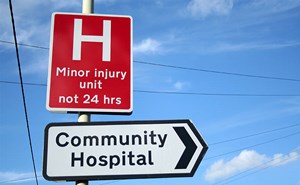It’s definitely reg season (health policy folks’ favorite time of the year)! Earlier this week, the Centers for Medicare & Medicaid Services (CMS) issued a proposed regulation impacting Medicare outpatient hospital payments in 2022. Although the Calendar Year (CY) 2022 Outpatient Prospective Payment System (OPPS) Proposed Reg doesn’t directly impact physician payments like the CY 2022 Physician Fee Schedule and Quality Payment Program Proposed Reg (released last week) does, there are still some extremely important provisions that you as emergency physicians should know about.
First and foremost is the implementation of a new provider designation under Medicare called “Rural Emergency Hospitals” (REHs). As background, in order to increase access to emergency services in rural areas, Congress included a provision in the Consolidated Appropriations Act (enacted last December) that would allow critical access hospitals and small rural hospitals (those with less to than 50 beds) to convert to REHs starting on January 1, 2023. REHs, once established, will not provide any inpatient services, but must be able to provide emergency services 24 hours a day/ 7 days a week. Further, they must meet other requirements, including, but not limited to: having a transfer agreement in place with a level I or level II trauma center; adhering to quality measurement reporting requirements that will be set by CMS; and following new emergency department (ED) conditions of participation (COPs). With respect to payment, REHs will receive a five percent bump up to the facility payments that hospitals traditionally receive for outpatient services under the Medicare OPPS. They will also receive an additional facility payment on top of that. It is important to note that although there will be higher facility payments for REHs, you as emergency physicians will not receive any higher payments under the Medicare physician fee schedule if you provide services in REHs.
To get REHs up and running by 2023, CMS must create all the requirements associated with the new facility-type through regulations. While CMS didn’t have to include any proposals in this year's reg (which again, affects 2022 payments), we at ACEP thought CMS may start the implementation process for REHs early. Therefore, we held a meeting with CMS staff who are in charge of implementing this provision in June to provide our initial feedback. We also had a Congressional meeting on this before the reg was released.
We wound up only being partially right. In the reg, CMS does NOT include any specific REH policy proposals, but does include a large request for information (RFI) to help inform proposals that it will include in next year's reg. The RFI includes questions on the following topics: 1) Type and Scope of Services Offered by REHs; 2) Health and Safety Standards, Including Licensure and Conditions of Participation; 3) Health Equity; 4) Collaboration and Care Coordination; 5) Quality Measurement; 6) Payment Methodology; and 7) Enrollment Process. In all, there are 29 questions in the RFI—and ACEP will definitely be submitting a comprehensive response.
Beyond REHs, there are a few other proposals in the OPPS reg that I want to highlight.
Compliance with Price Transparency Requirements: CMS is proposing to beef up penalties for hospitals that do not comply with the price transparency requirements that went into effect this year. As you may recall, starting January 1 of this year, hospitals are required to post payer-specific negotiated rates for 300 “shoppable” services in a consumer-friendly way. Hospitals must also post available payer-specific negotiated rates for all services (including emergency services) in a “machine-readable format.” Hospitals are required to post facility fees and the professional fees for physicians employed by the hospital. Thus, if you are employed by your hospital, the rates for your services must be posted.
Compliance with these requirements is very low thus far. In the reg, CMS cites numerous studies that demonstrate the lack of compliance among hospitals including a Health Affairs article from March that pointed out that only 35 percent of a sample of 100 large hospitals were sharing all required information. In addition, a bipartisan group of Congressional representatives wrote a letter in April to the Secretary of the U.S. Department of Health and Human Services (HHS), Xavier Becerra, requesting that HHS conduct “vigorous oversight” and enforce “full compliance” of the requirements.
To address these compliance issues, CMS is proposing to increase the civil monetary penalties that the agency will impose on hospitals that don’t meet the requirements. Specifically, CMS is proposing to set a minimum penalty of $300/day for smaller hospitals with a bed count of 30 or fewer. CMS will then scale up the penalty for hospitals with more than 30 beds, setting the maximum daily dollar amount at $5,500. This penalty structure would yield annual penalties ranging from $109,500 ($300/day x 365 days) to $2,007,500 ($5,500/day x 365 days). CMS is seeking comment on this proposal as well as some alternative penalty structures it could impose instead.
Changes to the Inpatient Only List: In last year’s OPPS reg, which was released by the previous administration, CMS proposed and finalized a policy that would eliminate the Inpatient Only (IPO) list over a three-year transitional period. This is a list of procedures which can only be performed in a hospital inpatient setting. CMS began with the removal of nearly 300 musculoskeletal-related services in 2021, which makes these procedures eligible to be paid by Medicare in the hospital outpatient setting in addition to the inpatient setting. Procedures removed from the IPO list are exempted from certain medical review activities related to the “two-midnight” rule policy. In ACEP’s comments on the last year’s reg, we had expressed concerns about the effects that eliminating the IPO list would have on observation stay reimbursement policies.
Now, in this year’s reg, CMS is proposing to retract the policy and stop the elimination of the IPO list. CMS will add the nearly 300 services that were removed this year back on the IPO list beginning next year. CMS is reversing course to ensure that services that are removed from the IPO list going forward are appropriately reviewed against CMS’ criteria for providing services in an outpatient setting. CMS is also seeking comment on whether the agency should consider eliminating the IPO list going forward. Furthermore, CMS is proposing to modify the two-midnight exemption policy it finalized last year— now requiring that all services paid for under the OPPS be eventually subject to medical review.
Hospital Quality Reporting Programs: CMS is proposing some changes to its hospital outpatient quality reporting programs with the aim of making reporting more meaningful for hospitals. The agency is also seeking comment on how it can reform these quality programs to improve data collection of social risk factors and do a better job of addressing health disparities.
In addition to the hospital outpatient quality reporting programs, CMS is seeking comment on a measure included in the Hospital Inpatient Quality Reporting (IQR) Program. Currently hospitals are required to report three self-selected electronic clinical quality measures (eCQMs) from an established list of eCQMs as well as the Safe Use of Opioids eCQM. CMS wants feedback on whether the required measure—the Safe Use of Opioids eCQM—should be optional going forward (i.e., whether hospitals could also self-select this measure from the list of eCQMs).
As background, the Safe Use of Opioids measure is a process measure that calculates the proportion of patients age 18 years and older who are prescribed two or more opioids or an opioid and benzodiazepine concurrently at discharge from a hospital-based encounter (inpatient and ED including observation stays). It was added to the list of required measures for the Hospital IQR program in the Fiscal Year (FY) 2020 Inpatient Prospective Payment System (IPPS) reg. In ACEP’s comments on that reg, we expressed concerns about including the measure in the Hospital IQR program—believing that the inclusion of the measure may have some inappropriate, unintended consequences. We stated that the measure could pose a potential bias against emergency physicians, who could, through no fault of their own, discharge a patient from the ED who has concurrent prescriptions of two unique opioids or an opioid and benzodiazepine written by another clinician unrelated and prior to the current ED visit. We also believed that the measure could jeopardize patient safety. We stated that the presence of the measure in the Hospital IQR Program could incentivize clinicians to abruptly cease a patient’s established medications during emergency situations, which could potentially result in the undertreatment or mistreatment of pain or development of withdrawal syndromes. Despite our objections to the measure, CMS added it to the Hospital IQR Program anyway— including in the ED setting. The comment solicitation included in this year’s OPPS reg will give us another opportunity to express our concerns.
Comments on all the proposals and requests for information and feedback in the OPPS reg are due on September 19, 2021. ACEP will be working on our response to the reg over the next several weeks.
Before concluding, I want to make a quick programming note. Regs & Eggs will be taking a three-week summer vacation and will be back in full swing on August 19th. Until then, perhaps you can try something different for breakfast each Thursday morning—although I know you all never get tired of having regs with your eggs!






